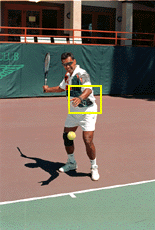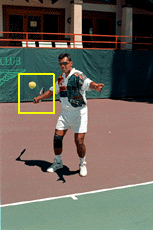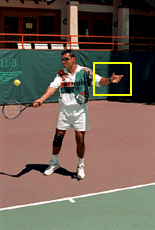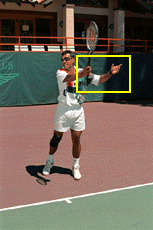|
TennisOne Lessons

 Tennis Lessons Tennis Lessons
Shot Selection in the Neutral Mode
Part 2: Forehand
By Nigel O'Rourke
Written by Jim McLennan, Senior TennisONE Editor
Photographs by Steve Margheim
Again, the "neutral mode" is when you are in a
baseline rally where neither you nor your opponent has the advantage. In
this situation, you want to make solid contact, drive the ball deep, and
move your opponent around hoping to create an opening to move to attack.
In the first photo below, Nigel has setup early for this neutral forehand.
He's balanced, and his left arm is swinging out toward the ball as he begins
to shift his weight forward. In the second photo, note how Nigel's racquet
is coming forward such that the "butt cap" of the racquet will
be directly aligned with the ball. This position gives him leverage to unwind
and literally pull the racquet into the ball. In the third photo, Nigel
continues to unwind. Contact is well away from the body, his head is still,
and his left arm has finished its forward rotation. A word here. In many
of the forehand articles within TennisONE, we've drawn attention to the
dynamic role of the non-dominant arm. This does not mean you should
swing wildly and continuously, which would interfere with the rhythm of
the swing and cause you to open his shoulders and body too soon.
Rather we prefer that the left arm swings to a stop in the "catching
position," as seen in the fourth photo. Though Nigel hasn't caught
his right hand with his left, he could have, and this finishing position
indicates that his body as in the shot.


 
Again, the neutral mode, you want to concentrate on your stroking mechanics,
ensuring that you minimize unforced errors while driving the ball deep and
moving your opponent around.
Go To:
Tennis Lessons Library
Back to TennisONE Home Page
What's New | Tennis
Lessons | Tennis
in Your Area
Tennis Fitness | Tennis
Products | Sponsors/Advertisers/Consultants
webmaster@tennisone.com
TennisONE© is a trademark of TennisONE© and SportsWeb ONE©.
Copyright© 1995. All rights reserved.
|
|